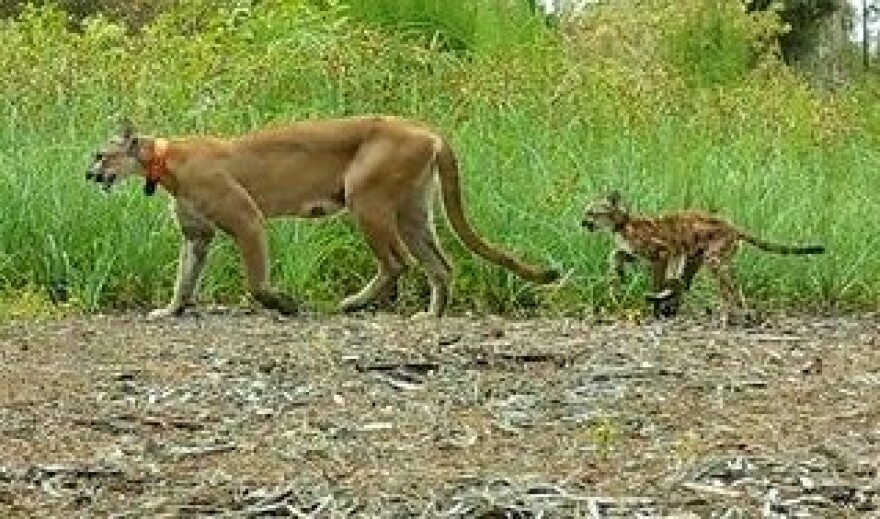A U.S. district judge ruled that by putting Florida in charge of approving certain permits to fill in or build on wetlands in Florida, the Fish and Wildlife Service and the Environmental Protection Agency violated the Endangered Species Act.
Washington, D.C.-based Judge Randolph Moss, in a 97-page ruling, overturned the federal agencies' decision, which was made four years ago, because they did not follow the required steps to make it legal for Florida officials to make such decisions.
“Today’s ruling sends a clear signal that Congress meant what it said when it passed the Endangered Species Act," said Christina I. Reichert, an Earthjustice attorney. “No state can be allowed to take over a federal program as important as the Clean Water Act’s wetlands permitting program by making an end run around the endangered species."
The federal judge's ruling means state agencies such as the Florida Department of Environmental Protection cannot approve the certain types of permits required before anyone can build on a wetland.
And that stalls a pair of developments in the western Everglades — Kingston in eastern Lee County and Bellmar Villages in eastern Collier County — giving a big win to the large contingent of environmentalists opposed to the projects.
Seven environmental groups, represented by Earthjustice, sued the EPA in January 2021 in U.S. District Court for the District of Columbia challenging the agency's decision to allow Florida to make such decisions. A key reason, Earthjustice claims, is because the state program weakens protections for endangered species and habitats affected by development in wetlands.

Florida argued its approach is intended to streamline the permitting process while ensuring that endangered species are still protected, addressing previous criticisms, and aligning with legal precedents.
Earthjustice said the court's opinion indicates Moss did not agree with the state's contentions, and Florida’s program did not include adequate analysis of species-specific impacts nor provide proof Florida’s program would not jeopardize endangered or threatened species.
The move to allow the state to make certain federal permitting decisions has been backed by business groups such as the Florida Chamber of Commerce and the Association of Florida Community Developers. Supporters argued it would reduce duplicative state and federal permitting and give Florida more control.
Environmental groups touted Moss’ ruling, which covers permits for dredge and fill activities often associated with large developments such as Kingston and Bellmar which, combined, would involve 11,884 acres of land, build 15,208 residential units, and create 800,000 square feet of commercial space.
Moss' decision may set a national legal precedent for states in similar situations.
From Trump to DeSantis
The EPA approved the transfer of the permitting authority to Florida in December 2020, about a month before former President Donald Trump’s administration ended. Florida became the first state in 25 years, since Michigan in 1984 and New Jersey in 1994, to receive the authority, which is usually held by the Army Corps.

Environmental groups had warned that the handover from the Trump administration to Florida’s DeSantis administration would “degrade and ruin Florida’s natural landscape, all in violation of federal environmental laws.”
The organizations that filed the suit in January 2021 are the Center for Biological Diversity, Defenders of Wildlife, Sierra Club, the Conservancy of Southwest Florida, the Florida Wildlife Federation, Miami Waterkeeper, and St. Johns Riverkeeper.
The court’s ruling resolves part of the lawsuit that concerns the federal agencies’ failure to comply with the Endangered Species Act. The remainder of the suit, which concerns violations of the Clean Water Act and Administrative Procedure Act, is ongoing.
While invalidating the wetlands permit issue, Moss gave federal and state officials 10 days to request a temporary halt to the enforcement of his ruling. Nevertheless, he wrote that such a "stay" would not apply to pending or future permit applications that would affect endangered or threatened species.
The ruling focused, in part, on whether the Fish and Wildlife Service properly prepared a biological opinion and what is known as an “incidental take statement.”
The "incidental take” permit system has been part of the legal framework of the Endangered Species Act since 1982 when Congress added it to the law while otherwise strengthening it.
"Taking," as used in the language of the ESA, refers to unintentional harm to a protected species during activities that are otherwise lawful if, among other provisions, it could be proved that "the taking will not appreciably reduce the likelihood of the survival and recovery of the species in the wild.”
Critics of the incidental take provision find a lot to dislike about it, one thing being that the term appears crafted to avoid using any of the ten words that define it in the ESA. The words start with "harass" and move through "hunt, shoot, wound" to "kill" a species — an all-too-often outcome, and perhaps why the term is not "mistaken death."
Moss said a biological opinion and incidental take statement did not comply with the Endangered Species Act and another law known as the Administrative Procedure Act, thus the EPA's reliance on them was legally flawed.
“Protecting the nation’s biodiversity has never been more important,” said Tania Galloni, an Earthjustice attorney. “That’s why we’re fighting to make sure state programs comply with all federal protections for endangered species.”
Lee, Collier developments halted
Southwest Florida has a lot at stake in Moss’ ruling.
Six proposed development and mining projects that were going through the state’s wetland permitting program that have now been halted would have put tens of thousands of wetlands at risk.
The six include Kingston and Bellmar, but the other four alone put at risk another 8,000 acres of the most important habitat for the endangered Florida panther. Southwest Florida is the only area where the big cats remain, and their population was last estimated at 120-230 adults, juveniles, and kittens.

Recent meetings about both developments have been packed with opponents.
Bellmar Village, one of four hamlets in the much larger Town of Big Cypress complex, is to be built within one mile of the Florida Panther National Wildlife Refuge, a 26,400-acre unfenced habitat for the endangered animal established more than 30 years ago.
The roads near Bellmar Village, such as Golden Gate Boulevard and Oil Well Road, are already deadly hotspots for panther-vehicle collisions. Environmentalists say future residents of Bellmar will add 45,000 vehicle trips daily on roads near the panther refuge.


The Fish and Wildlife Service, the agency implementing the Endangered Species Act, signed off on both the Bellmar and Kingston developments despite admitting at least two dozen panthers will die each year because of their existence.
“The regulation has been completely eroded to the developer's favor, and the panther is going to pay the price,” said Patty Whitehead of the Responsible Growth Management Coalition of Southwest Florida, who spoke in opposition at protests against both developments. "There is no mechanism now to protect panthers. There isn’t. It’s gone in Florida. It’s gone.”
Kingston’s developers are eyeing a vast swath of land abutting the Corkscrew Regional Ecosystem Watershed, a 60,000-acre conservation area that straddles the Lee and Collier county lines.
Much of the watershed is far from roads and traffic and is home to the Florida panther, snail kite, bobcat, and wood stork. Public trails are part of the preserve, which directly connects to other protected lands.
Estimates predict, when and if built out, Kingston's size, and all its new roads will translate into 95,000 additional daily vehicle trips on eastern Corkscrew Road.
In return for approval, the developer has promised to restore about 3,200 acres.
Last-minute reprieve
In December 2023 Earthjustice requested a temporary ban on behalf of two of the plaintiffs, the Center for Biological Diversity and Sierra Club, just as Florida was poised to issue permits for Kingston and Big Cypress.
Earthjustice argued the projects are planned for a key wetlands area and a critical wildlife corridor where the few hundreds of endangered panthers remain in their last territory on Earth.
Rather than rule on just that request, Moss ruled in favor of the environmental groups on the underlying claims.
“The court’s ruling is a reprieve for critically endangered species like the Florida panther, but we’ll never prevent the extinction of our most vulnerable wildlife unless we stop bulldozing the wild places where they live,” said Elise Bennett, director at the Center for Biological Diversity. “The Endangered Species Act can save these magnificent creatures, but only if our agencies follow the law.
"We’ll continue to fight sprawling developments that rip apart the precious wetlands and interconnected natural spaces that Florida’s most imperiled wildlife need to survive.”





